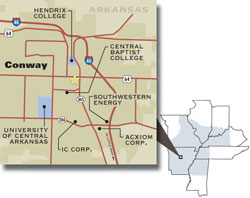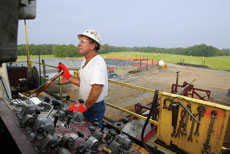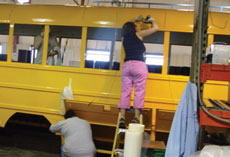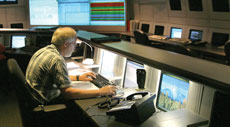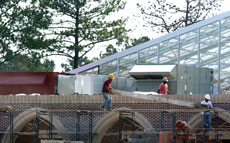Community Profile: Conway, Ark., Makes Play for Economic Boom
|
|||||||||||||||||||||||||||||||||||||||
Good fortune runs in a strip across north-central Arkansas, anywhere from 1,500 feet to 6,500 feet below the ground.
Drills chew through the earth toward this good fortune, aka the Fayetteville Shale Play, a rich natural gas deposit that stretches 100 miles long and 20 miles wide. (Shale is a rock that yields gas after being put under extreme pressure. "Play" is an energy industry term that describes a portion of the exploration and production cycle after companies identify an area with potential oil or gas reserves.)
"Conway seems to be the heart" of the play, says John Thaeler, senior vice president of SEECO Inc., a subsidiary of Houston-based Southwestern Energy Co., which holds about 1 million acres in mineral leases throughout the state. "This is going to be a huge boost to the economy."
A recent study conducted by the University of Arkansas College of Business and paid for by Southwestern Energy concluded that the play will add $1.6 billion to the state economy this year, employ more than 6,600 workers and generate nearly $106 million in state and local tax revenue.1
"The play's greatest benefit to the state of Arkansas is that it will provide an economic stimulus and will diversify the employment base, reducing the dependence on manufacturing and retail, and providing many jobs with above-average pay," economist Jeff Collins predicted when the study was released. Collins served as director of the Center for Business and Economic Research at the University of Arkansas and now runs a consulting firm.
In Conway, the play benefits a city long noted as an education center (see sidebar), but one that also boasts a strong manufacturing sector. This Little Rock suburb features a blend of traditional and high-tech businesses.
The natural gas boom began in Arkansas after Southwestern Energy successfully drilled test wells in the Conway area in 2004. Chesapeake Energy, based in Oklahoma City, followed Southwestern to Conway, as did natural gas company suppliers like National Oilwell Varco (NOV) and Schlumberger.
|
Southwestern opened a Conway office in 2005 with 12 people. Now, the firm has more than 400 employees working in Conway. Southwestern plans to invest nearly $1 billion in the shale play this year, in part by building between 400-450 horizontal wells, which drill down to the gas reservoir and then move horizontally through the gas-bearing zone.
Landowners who allow energy companies to explore for gas on their property get a part of the cut—one-eighth to one-fifth of the sales profit once the gas goes to market.
Companies usually expect about 20 years of production from a working well, but that estimate is subject to considerable uncertainty.
"You really don't know how much these wells will produce, or how the technology might advance and let you produce even more," Thaeler says. "We have wells in Texas that have been pumping out gas for more than 30 years."
School Bus Capital
Long before energy firms began drilling in Conway, workers here built school buses. IC Corp. makes more school buses than any other company in the United States, says IC's plant manager, Ed Hartung. In 2007, the company expects to complete as many as 8,000 school buses, plus some prison buses and tour buses.
With more than 1,200 employees, IC is the largest manufacturer in town. (Other large manufacturers include Virco, with 821 employees; Kimberly-Clark, 481; and Snap-on tools, 472.)
Founded as Ward School Bus Manufacturing in Conway in 1933, IC is a wholly owned subsidiary of International Truck and Engine, which, in turn, is part of Navistar, based in the Chicago area.
A typical wage for IC assembly-line workers, who are represented by the local United Auto Workers union, is $15.75 an hour. "For the person in Conway who has a high school education and who is looking for a good wage and great benefits, we fill that niche," Hartung says.
Conway High-Tech
Acxiom, founded in 1969, grew out of the bus builder's data processing department. The company manages data for an international clientele, helps companies analyze and build on their customer base, and identifies the best strategies for information management. Acxiom has branch offices in the United States and in 10 countries around the globe, with 7,000 employees worldwide.
In late May, a private equity firm announced that it wanted to buy Acxiom. Because the deal won't close until mid-September, it's hard to tell what impact the buyout will have on the company or Conway, says Jerry Adams, Acxiom's economic development chief and director of community relations.
Adams also serves as chairman of a statewide economic development group, Accelerate Arkansas. He says that Acxiom is a model for the type of high-tech, white-collar businesses that Arkansas wants to attract.
Brad Lacy, head of the Conway Development Corp., agrees. "The natural gas industry has gotten big here over the last couple of years, but that's like a present given to us," Lacy says. "We've shown that we can grow a major technology firm here, and we want more of that."
The city population has grown by almost 9,000 people since 2000, according to Census Bureau figures. Over the past several years, Conway also has added the 650,000-square-foot Conway Commons mall and several chain restaurants. Downtown has undergone revitalization, including a $2.5 million renovation of the historic Halter building, constructed in 1917.
The growth in Conway notwithstanding, Acxiom decided in 2000 to transfer its corporate headquarters to Little Rock, which makes it easier to attract and retain top executives, Adams says. About 700 Acxiom employees work in Little Rock. Acxiom still has about 2,000 employees in Conway on a 12-building campus.
"Getting workers to come to Conway is becoming easier all the time," says Adams, who is originally from St. Louis. "It's one of those things where you still have the small-town atmosphere, but there has been so much growth in recent years, and the big city (Little Rock) is just 30 minutes away."
Endnotes
Views expressed in Regional Economist are not necessarily those of the St. Louis Fed or Federal Reserve System.
For the latest insights from our economists and other St. Louis Fed experts, visit On the Economy and subscribe.
Email Us


